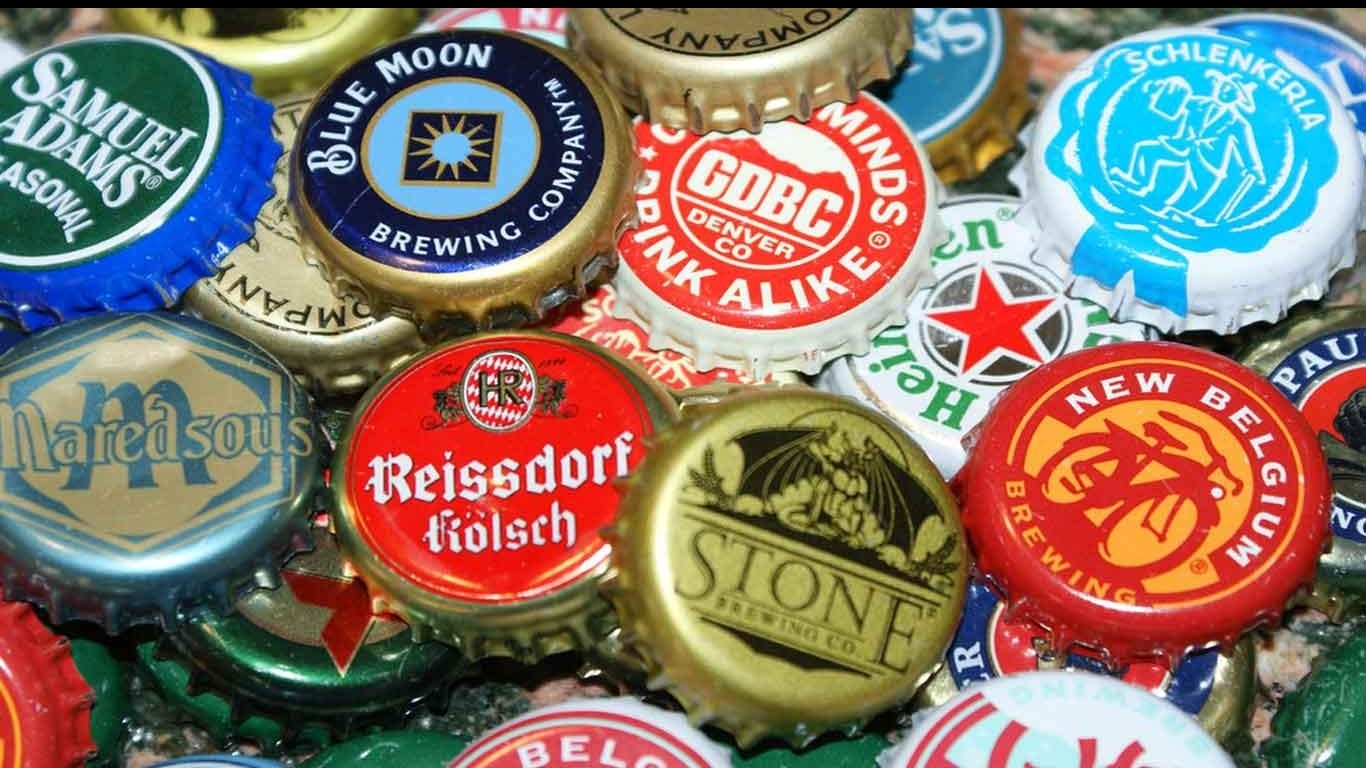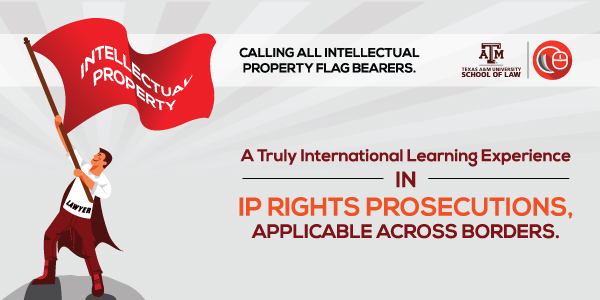Who can enrol for the LawSikho Courses?
We recommend that you should have completed your Higher Secondary / Class XII from a recognized Board / University. In the case of foreign nationals, you should have completed the equivalent of Higher Secondary in India in your respective country. You should also be comfortable with the English language and using a computer. However, we have no formal pre-qualification requirements because we are not a University or college. Anyone who wants to learn is welcome to join our courses.
Are hard copy study materials provided for reference, or are there only online classes?
Students of LawSikho will be provided, we will dispatch hard copy materials within 45 days of your course commencement date.
However, online classes, videos, regulatory updates and periodic upgrades to the courses cannot be included in the hard copies. We will provide you with hard copy material for all important chapters. We keep adding many new chapters from time to time and there are restrictions on page numbers so all online material cannot be available in hard copy. We would keep adding new material online from time to time, so please do not expect all such material to be made available in the hard copy also. You can use the hard copy materials for your reference, however, we recommend that you do not exclusively rely on hard copies for cracking the assessment test and the exercises. Please refer to the online library of materials from time to time.
Note: We will send hard copy material through our service partners. We have three service partners.
1. Indian Speed Post (Provides delivery ‘anywhere in India’ under contractual service)
2. Delhivery
3. Trackon Couriers Pvt Limited
If our service partners do not have a presence in your area and want to get the hard copy, you can send us a specific request.
LawSikho will not be responsible if the speed post bounces back or hard copy material is not delivered. We will levy the courier charge on you in such a scenario.
Please visit the respective course page to learn more about the hard copy study material policy of that course.
Will international students also be sent hard copy material?
If international students require hard copy material, they need to share their correct address and we will let them know the cost of the courier which they need to pay and then the hard copy will be dispatched. This is the process because the cost of an international courier is very high compared to the domestic courier within India (for domestic courier we have no additional charges). Some international students provide us with an Indian address for couriering hard copy material. In those cases, we charge nothing extra for the courier.
How do I figure out if the course covers a specific topic I want to study?
A person can visit the official website of LawSikho and find the relevant course and see the course syllabus, learning objectives and even a list of weekly exercises. You can also subscribe for free sample material. If more clarification about the course is needed, feel free to chat with our online chat specialist. You could also call us on our landline number, +91 11 40845203 for further assistance.
How can I get access to a demo class?
We do not offer any demo classes. You will not understand the course's quality by attending a single class as the results we produce is done through a combination of many things - study material, assignments, personal feedback on assignments, and then finally, class. The only way to experience the course is to take the course for a month, risk-free, as we give no questions asked and refund between the 30th and 45th day provided you attend all classes and solve all the assignments.
The refund policy may vary. We advise you to go through the refund policy given on the respective course page to know the actual refund policy applied to you.
Are there any minimum attendance requirements?
There are no minimum attendance requirements, as we will teach the course online through a Learning Management System that allows you to pursue the course at your own pace and convenience.
We will conduct online weekly classrooms for 1.5-3 hours. Attendance is recommended. Feedbacks by our experts on your assignments submitted is the goal of our sessions.
To know more about exercises and assignments submission requirements, please check the course page.
Can we take the tests at our convenience, or will they be available only at a specific time on a particular day? What happens if I cannot take the tests at a particular time because of exams, internships or other commitments?
As candidates will be enrolling from across India and abroad, every candidate's schedule is likely to differ. The test will be available on the online portal for a substantial period so that you can take them at your convenience. We will give sufficient opportunity to everyone to attempt the test.
If any student is unable to attempt the test or facing any issues, can mail us at [email protected]
Requirements of the online test may vary as per the course. We suggest you read the test details on the course page to learn more.
How are online MCQ tests executed? Can I give the monthly tests and the final exam at home? Or do I need to go to an online centre?
The online MCQ is executed on the Learning Management System. You do not have to go to any special centres to give the test or exam. You can attempt the test by logging on to the online Learning Management System from your home or anywhere you wish. We recommend using a computer while giving these tests, as mobile phones are unreliable for giving tests.
Students should finish the MCQ test within the stipulated time in one sitting.
Please visit the course page to know MCQ test fees and guidelines.
What payment methods do you accept?
You can use any of the following methods to pay for the course.
- Online payment through Razorpay - Credit Card, Debit Card, Netbanking, Amex & UPI
- International students can use Razorpay or Paypal
- NEFT/ RTGS (online through your bank account) or offline
For further details on making payments, please visit our enrolment page or call on +91 11 40845203 for assistance.
Are there any financing or EMI options for payment of the course fees?
If you have a Credit Card with one of the following banks, you can pay using an EMI option.
- ICICI Bank
- Axis Bank
- Standard Chartered Bank
- Kotak Mahindra Bank
- HDFC Bank
- Yes Bank
- IndusInd bank
- RBL Bank
Can the course fee be paid in instalments?
We allow our students to make the payment in installments. To know more about it, get in touch with us at +91 11 40845203.
Would Live classes start from Module 1?
Please do not expect us to teach you like college courses. Those are not effective. Our focus is on giving you a realistic experience of doing legal work. Hence you will get different exercises and assignments every week and all relevant material to solve them. Please do not worry that you have not read other associated concepts. We are recreating the experience of working in a law firm or in-house legal department, and we found that this is the kind of training that works best. Live classes will relate to the week’s assignments. You can read the modules from module 1, but we advise you to follow the courses according to where the assignments take you. By the end of the course duration, you would have covered all the syllabus and retained everything.
If it feels complicated and challenging midway, do not worry. The course is designed like this. You need to stick to it, hold on for dear life and ride along as you ride a roller coaster. Our responsibility is that you are satisfied and get all the results that you were promised by the end. If you are not, you can hold us responsible. But please, please trust the course design and stick to it until the course gets over.
Are there any discounts available?
No, there are no discounts available. We do not believe in discounts and never give one. Prices have only increased over time and not decreased.
How is the course administered?
The course starts on the commencement date for your batch. You would get access to all the study materials on the online learning management system, which you can view on your computer or mobile phone (Android & iOS). The study materials cannot be downloaded or printed.
We will dispatch hard copy materials for reference within 45 (forty) days. We cannot deliver videos and periodic updates in hard copy; hence hard copy materials are not recommended for studying to attempt exams. To stay updated with the latest developments, we strongly recommend that you learn from online materials.
Every week, you will be given exercises to perform, which we will discuss in a live online classroom.
What are the passing criteria?
The passing criteria for any course are 40% of the total marks and completion of weekly exercises, articles/assignments as mentioned in the course guidelines.
Please check the passing criteria section on the course page for more details.
What if a person fails to pass the course?
You can attempt the MCQ test only once.
If you fail in a course, you can request a re-examination once again. You can re-submit the required exercises and articles with a deduction of 3 marks.
For exercises that you have already submitted, and you do not wish to re-attempt, your marks will remain the same. We will give you some additional exercises to attempt to increase your chances of completing the course successfully. It will also enhance your learning.
How do I clear my doubts online?
If you have any doubt or question relating to the content, please write on the discussion forum of the LawSikho platform itself. Our concerned experts will respond to you within 24 to 48 working hours. You can also write your queries to [email protected]. Our concerned executives will support you to get your questions resolved within 24 working hours.
What are the days and timings of Classes?
We ensure that class timings enable a maximum number of students to participate and take out time from work or college while at the same time they are feasible for experts.
Classes will be of 1-hour duration and will be held in any of the following time slots:
- Weekdays: 8:00 pm - 10:00 pm IST
- Saturdays: 7:00 pm - 10:00 pm IST
- Sundays: 10:00 am - 8:00 pm IST
You will be informed of the class timings for the relevant week at least 48 hours before the class via email notifications and WhatsApp messages. We will also add it to your Google calendar.
We will ensure we have fixed timing for this class to schedule your day well in advance according to it as far as possible.
Recordings of class sessions will be made available on the online learning management system for accessing within 48 hours of the session conducted.
How do I get my LawSikho certificate after completing the course?
Those who complete the course successfully will be awarded a LawSikho certificate. The certificate will be dispatched within 45 (forty five) days of course completion.
Please check the course guidelines for more details.
I am likely to have a busy schedule this year because of academics, co-curricular activities or enrollment in other courses like the CS course. Will this course be very demanding or time-consuming?
The course is designed keeping in mind the schedule of practising lawyers, working professionals, entrepreneurs and full-time students. The learnings are well spread out over a long period. There would be a specific learning objective every week, accompanied by assignments. It takes about 8-10 hours for a person of average intelligence to complete all course activities every week. You need to take this course one week at a time.
We do not guarantee that you will pass the course without putting in reasonable effort or attention. Still, the exact amount of time you would need to dedicate depends on your ability to grasp the material.
Is it possible for a person who doesn't know the law to study independently with the material given?
Yes, knowledge of the law is not a prerequisite for deriving value from the course. It is possible that what you learn in this course is entirely independent of any other course you have probably pursued or are pursuing. The course is designed keeping in mind that there will be many non-lawyers taking up this course. The only knowledge we assume is what one would expect to know after completing higher secondary school. All modules are reviewed from a high school graduate's perspective and ensured that they are effortless to understand.
You only require knowledge of the English language and basic computer skills to understand the concepts.
Is there placement or internship assistance for candidates who enrol in the course?
An active placement assistance program is available to students, including CV-writing, career guidance, and sharing of relevant job and internship opportunities. Job and internship opportunities will be shared with students on the WhatsApp group from time to time. Students who complete the exercises and perform well in those exercises and classes can be recommended to law firms, lawyers chambers and companies for jobs and internships. However, we do not guarantee any job or internship.
We have also started a career clinic for the benefit of our students. Students can visit our office in Delhi or seek career-related insights over phone or video calls on pre-designated days. More than 2000 positions have been shared with our students to date, and hundreds have got placements and internships through us. Our students have been placed in various law firms and other organisations as full-time employees and have obtained multiple opportunities for internships under the programme. How many opportunities you get will depend on your efforts in the course, and if you do the course well, you will be able to find jobs on your own.
We will also provide you with a career development course free of cost if you need it. Just ask our customer support if and when you need it after participating in at least three months of classes.
We also help you enhance your CV by writing and publishing articles and giving you networking exercises and coaching to build your professional network. Creating your professional network can make excellent opportunities available to you that you cannot even imagine today.
For more details, please see the placement assistance guidelines given on the course page.
What is unique about LawSikho courses? Why should I not take up any other online law course provided by other websites or a University, especially if it is significantly cheaper?
How the courses are created, and its philosophy - We aim to create extraordinary lawyers and support the legal industry. You will find no other course which is as practical, provides as much personal attention to every student, or as many opportunities.
Syllabus, coverage and approach to issues - We do not spoon-feed you but give you experience what you will experience when you work at top law firms or big in-house legal departments. You will be prepared for the best and the worst. You will learn to deal with any legal issues, even those we didn’t teach you about, because that is how our course is designed.
Live Exercises - Pilots are put on simulators to practice flying before they are given an actual aircraft to fly. That is how our courses work as well. Even before you start dealing with real-life cases and matters, we train you to do such work through simulation exercises. This experience is invaluable for ambitious lawyers. Think of our courses like an online gym or a martial arts dojo for learning legal skills that will make you amazingly successful.
Personalized support - you can ask questions in the learning management system, interact with us on WhatsApp groups and even call us when you are struggling. We are here to work with you to make you succeed.
Placement assistance - Do you know any other course where you get this level of placement assistance? Law firms and companies love to hire our students because it is tough to find such highly-trained talent. Ask our graduate students! Also, we make you write articles, publish, and enhance your CV and network with many people. This provides you with next-level opportunities in your career.
Doubt-clearing weekly exercises - Doubts are cleared every week. If you can’t wait, post your doubts inside the module itself, our experts reply within one working day.
What will be the grading system?
Grading system: Students will be graded according to the following grading system:
| Grade |
Percentage |
| F (Fail) |
<40 |
| C+ |
41 to 59 |
| B+ |
60 to 79 |
| A+ |
80 to 100 |
What if I want to migrate from one course to another?
Migration from one course to another is possible. Students should email their migration request to our support team at [email protected] within ten days from the enrollment date.
We will not accept any requests after ten days.
What if I want to migrate from one batch to another batch?
Yes, you can migrate from one batch to another after paying a migration fee of INR 2000/- (or as per the prescribed fee pertaining at the time of migration) and the course fee difference between the admitted batch and transferee batch if any. If migrated, the work or assignments submitted earlier by you will not be considered.
What if I am unable to complete the course in time?
A student is given sufficient time to submit the minimum number of required assignments. If they fail to do so, they can submit their pending assignments after the deadline with an extension fee of Rs 2000/- Please check the details of our different courses to know more about the assignment deadlines for individual courses.
We suggest you check the Migration Rules of your course on the course page.
Do you conduct exams after completing the course?
LawSikho conducts exams during the course duration. If the course is accredited by MEPSC, LawSikho will conduct one certification test during the course duration & the MEPSC will conduct another after completion of the course.
Is this course recognized by any third party or Government Authority?
LawSikho courses are offered by a private company as a solution to learn practical skills. There is no recognition, no accreditation and no affiliation from the government or any University or any third party unless specifically mentioned otherwise.
What if I can’t finish the weekly exercises?
Weekly exercises are very important to learn the practical aspects for which you joined the course. You get sufficient time to complete those. In case you can’t finish them within the due date, you get an extension to complete them with a deduction of a few marks.
You will not get a LawSikho certificate if you fail to submit the required number of assignments and articles. These are mandatory requirements for obtaining the certificate and value of the course for which you enrolled.
Does the certificate have marks or grades mentioned?
The certificate will have the Grade on it. If students want to know their scores, they can write to us at [email protected]. We will provide their scores.
Is there any written exam at the end of the course?
Yes, you will have to attempt just one MCQ test at the end of the course for LawSikho certification.
What if I submit all assignments but miss the MCQ?
You must complete the required number of assignments and the MCQ test to complete the course successfully. They are mandatory requirements. You won’t get the LawSikho certificate if you fail to fulfil these requirements.
What is an online Live class?
An online Live class is a video conference-based class that you can attend from mobile, tablet and personal computer through an application. You can see the teacher and the teacher can see you. You can even share your screen with the teacher for comments if the teacher requests it, and the teacher can show you his or her screen. You can see other people attending the class also. There is usually a lot of discussion amongst the students and teachers in the class. It is very much like a live classroom except that you do not have to travel to access the class; you can access it on the go as long as you have internet and a device.
Can I get personal guidance in working on assignments that I find challenging?
We will point you out the relevant reading material and templates and precedences you need to solve an assignment. You can also freely discuss with other students in the course WhatsApp group. You can post queries in the learning management system as well while working on assignments. During the live sessions, you can ask questions to the expert and get your issue resolved. Sometimes it may be possible to schedule a call with evaluators and discuss with them, but this is at the discretion of the evaluator and at a time of his or her convenience. We cannot handle unlimited calls with every small question. You have to respect the time and availability of the evaluators also. For that, you already have the Learning Management System and the WhatsApp group, where you can post an unlimited number of doubts.
How is our training methodology unique and industry-proven? Is it endorsed by the legal industry in India or abroad?
Our training methodology is unique. While any outside authority does not endorse it, the success of our students speaks for itself. Our methodology is described in detail in the previous questions. The legal industry loves to hire our students who have gone through the entire training we provided. Major companies have been hiring us to train their legal teams and managerial executives with cutting edge legal courses. This is proof of our success.
Are there going to be classroom sessions?
Yes, in all our premium courses, there are live weekly classroom sessions. Apart from one session related to your course, sometimes you will be invited to attend extra free sessions on writing, networking or other relevant skills. However, the course is conducted through an online learning management system, enabling students to access study materials from anywhere in the world at their own time and convenience. Course materials will be accessible on the online learning management system, which you can assess on a laptop/desktop. You can also access the course on your phone by downloading the LawSikho app. We may upload some course materials around the time of your class about the relevant issue. Apart from this, you will have access to significant hard copy material as well.
Live sessions on exercises shared will be conducted online every week. Once or twice a month, you will also have a session on writing influential articles and networking skills. In total, students will have 5-6 live sessions every month. At times there could be extra sessions that are optional to attend.
Our experts' weekly online sessions will include feedback on the previous week's exercise and explain new concepts related to upcoming exercises.
What if I cannot attend the classroom sessions?
Attendance for sessions is not mandatory but crucial for learning to perform exercises that add value. Students who miss the session can watch the recorded versions of the sessions conducted on the Learning Management System (LMS) and the assignment portal (anything that is easier for you, it is uploaded on both platforms). We will add the recorded session to LMS within 48 working hours.
It is highly recommended that you complete weekly exercises. It is mandatory to submit 50% of subject exercises per course requirement and all writing assignments.
All study materials, including text, videos, drafting exercises, templates and regular tests, will be available only on the LMS and accessed using your login ID for the LMS. Students can also access the course through the state of the art mobile Apps, making learning convenient and accessible on a real-time basis.
Some courses require 100% of subject exercise submission. Please visit the course page to know the number of exercises and assignments to be submitted for a particular course.
I cannot find my question here. How do I proceed?
For any other help or clarification, or grievance, please write to us at [email protected].
Our student support team representative will write back to you with a personalized response within 24 working hours.
Don’t forget to mention your Enrollment Number, Course and Batch when you communicate with LawSikho.
We are closed on Sundays and Central Government Gazetted Holidays.







 Key Highlights
Key Highlights
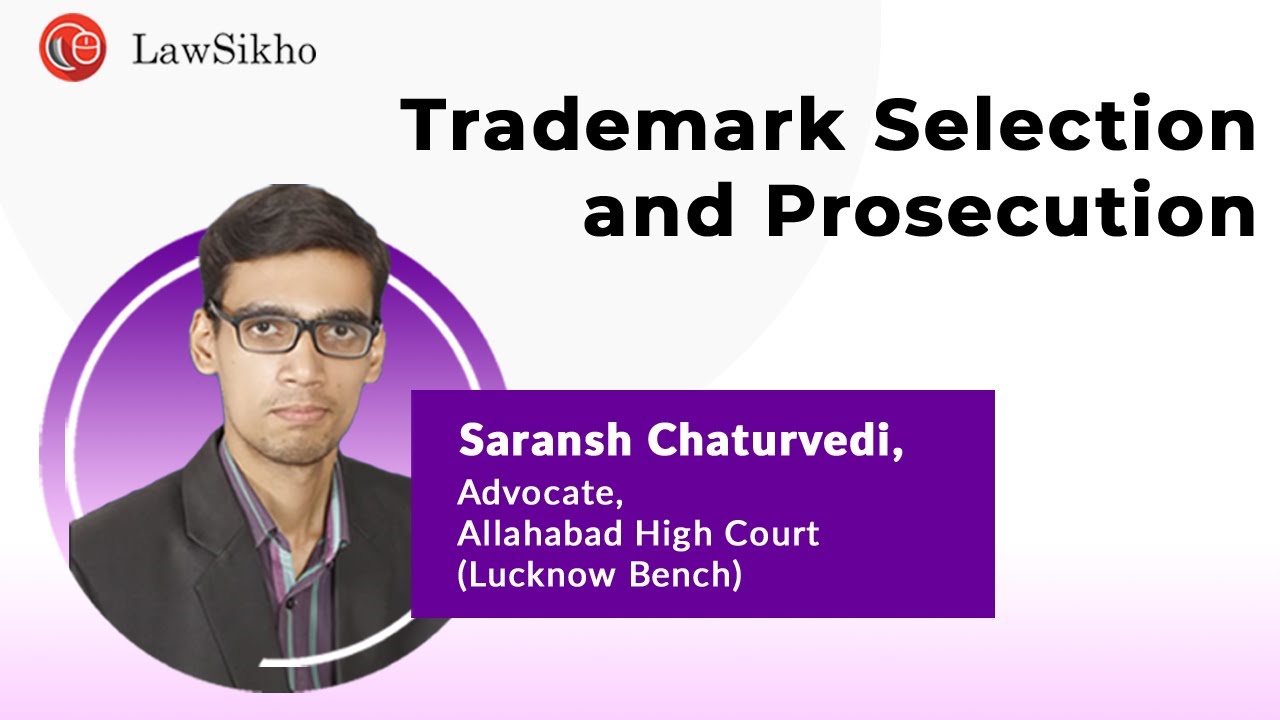
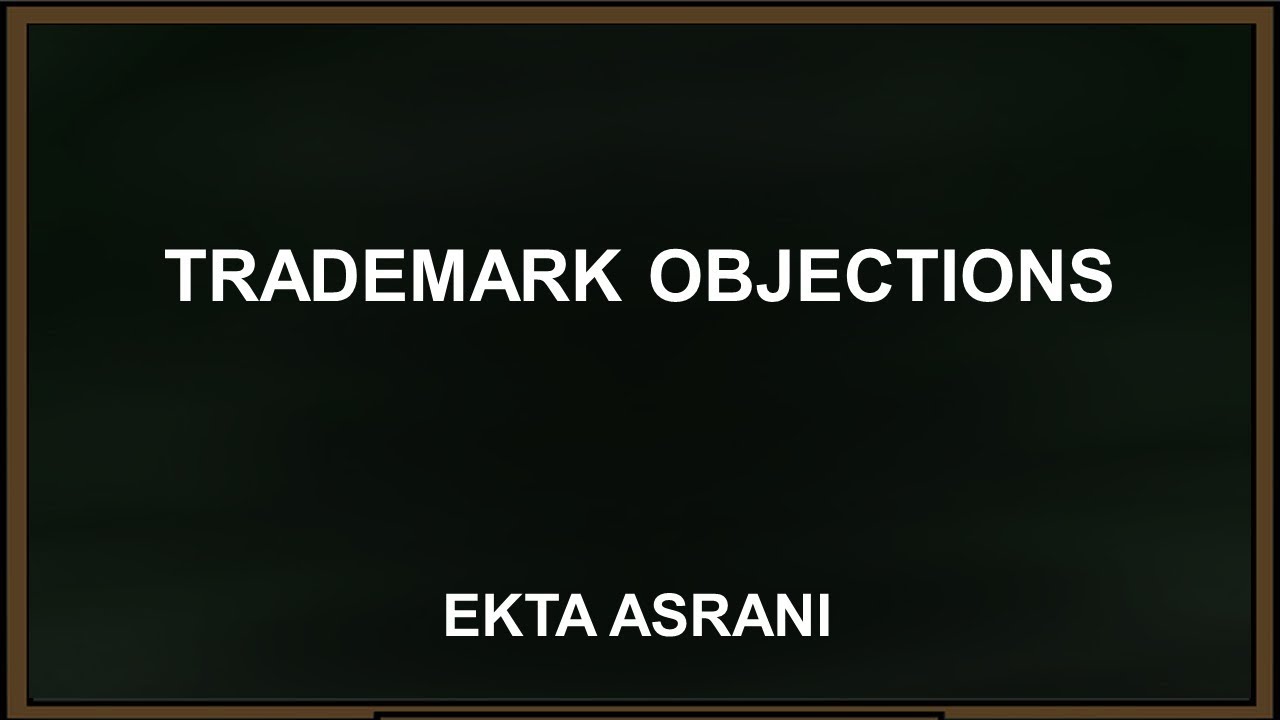



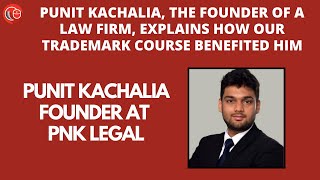

 Legal
Legal  Finance
Finance  Media Entertainment
Media Entertainment  Sports
Sports  Fashion
Fashion  Technology
Technology  FMCG
FMCG  PHARMACEUTICALS
PHARMACEUTICALS  LPO
LPO  E-COMMERCE
E-COMMERCE  FOOD AND BEVERAGES
FOOD AND BEVERAGES  HOSPITALITY
HOSPITALITY  AUTOMOBILE
AUTOMOBILE 


















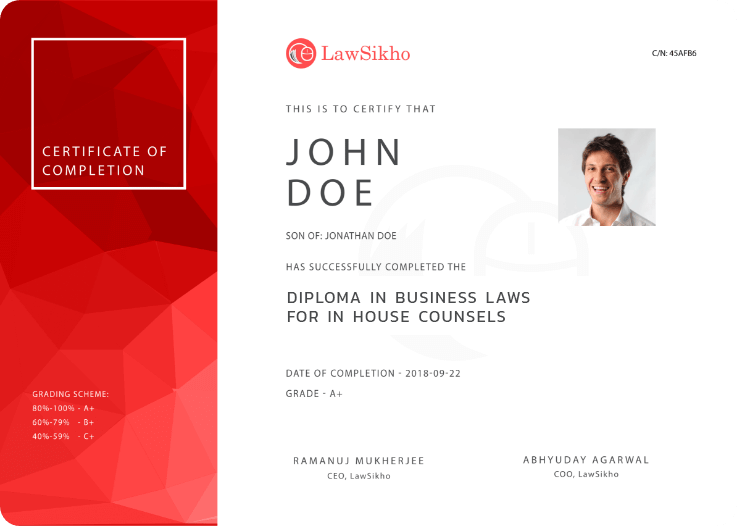




 ADDICTIVE LEARNING TECHNOLOGY LIMITED
ADDICTIVE LEARNING TECHNOLOGY LIMITED